SUMMARY
This is AI generated summarization, which may have errors. For context, always refer to the full article.
This compilation was migrated from our archives
Visit the archived version to read the full article.
MANILA, Philippines – The Senate has faced criticism in the past 3 years for being a “puppet” of President Rodrigo Duterte, capable only of token opposition to controversial policies in Malacañang. In the May 2019 senatorial elections, the self-declared “dictator” wants more allies in the upper chamber, often called the last bastion of democracy.
It’s going to be a very tight race, published surveys so far show. It’s potentially nasty. It will see a lot of movements and surprises as candidates jostle to stay or claw their way into the so-called “Magic 12.”
Duterte’s endorsement power will be tested as he is expected to campaign aggressively for 3 candidates, although he has 11 names on his personal slate. Analysts also see the polls as a referendum on his presidency, although this has yet to be seen. The survey leader, incumbent Senator Grace Poe, isn’t endorsed by Duterte but neither is she considered opposition.
“It’s only analysts and candidates who say it’s going to be a referendum on Duterte. I don’t think so. Voters will choose based on the personalities running and the benefits they think they will get from the candidates,” said Yolanda Ong, an advertising veteran helping the campaign of several candidates.
In this article, Rappler will crunch the numbers to show the trends based on published surveys before the official campaign started on Feb 12. It will also look into possible factors that could shake up this important elections, especially as 2022 looms and the country begins to search for Duterte’s successor.
In the race to the 12 slots, the senatorial candidates are fundamentally competing against each other despite their proclaimed alliances, especially so in a very tight race.
The campaign is bound to see Duterte favoring some candidates more than others. Richer candidates will have more ads. Some will, but some won’t, get the support of local kingpins who control regional or provincial command votes. Only 12 will get the reliable backing of the Iglesia Ni Cristo bloc vote. And if past senatorial elections are a guide, the elections will see allies junking allies in the end.
The results of the elections will either strengthen or weaken Duterte. His legislative agenda is on the line, including his bid to amend the Constitution and install a federal state.
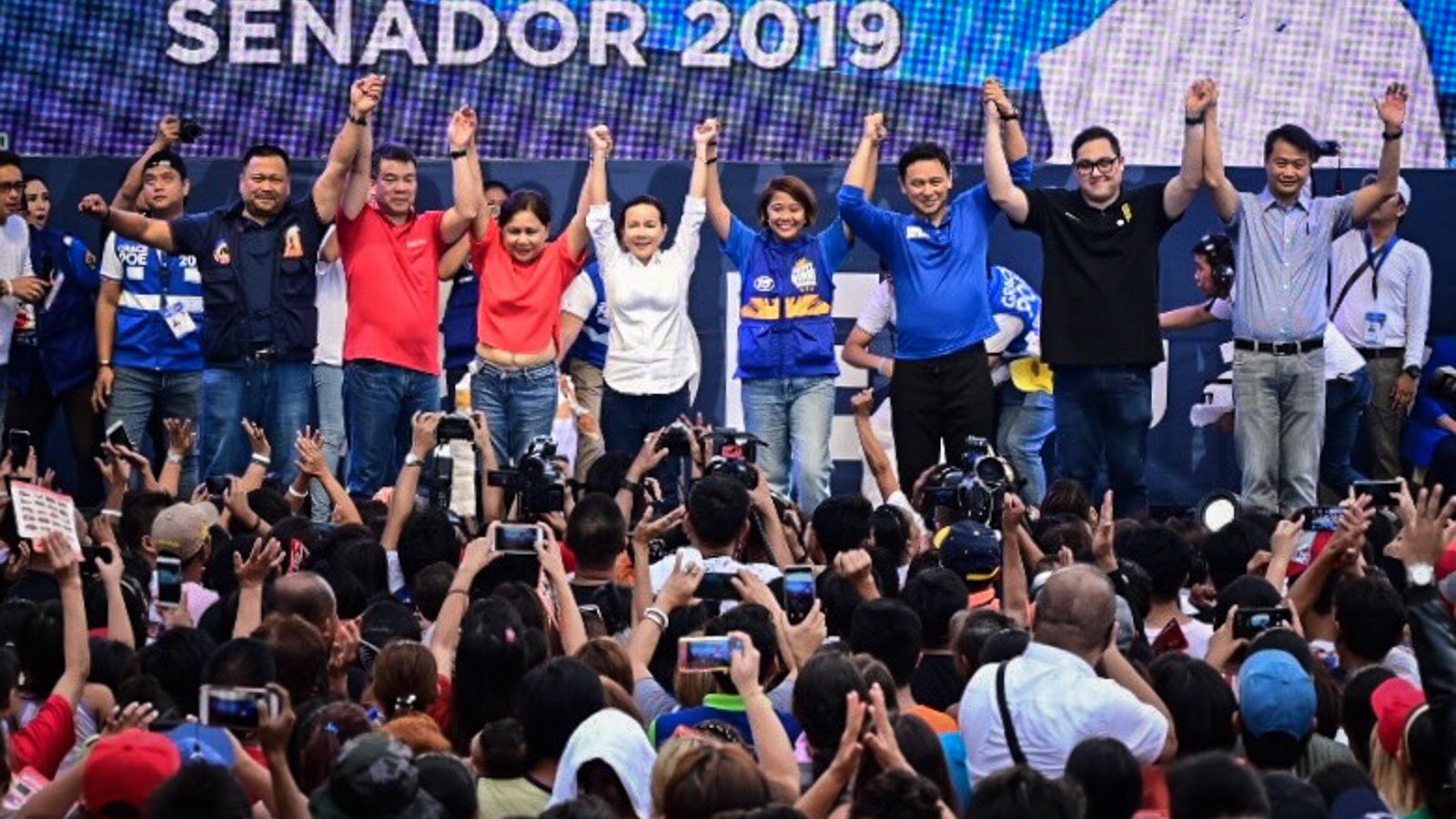
Old names dominate the race so far
Published surveys of Pulse Asia and Social Weather Stations (SWS) show reelectionists and returning senators dominating the race so far, with Poe leading the pack with an enviable voter preference of 60-75 points in public polls in December 2018.
She is followed by another incumbent senator, Cynthia Villar, who registered at least 57-66 points in the same period.
In both Pulse and SWS surveys the names in the Top 6 had been consistent from December to January although the rankings often shuffled because their numbers have mostly been statistically tied. Poe and Villar are joined by returning senators Pia Cayetano and Lito Lapid, and incumbent senators Nancy Binay and Edgardo Angara.
They’re all relatively new political brands but with familiar names, mostly wife or child of politicians who ruled the country post-martial law.
The 2019 elections will test an old assumption that the Top 6 candidates at the start of the campaign are safe. Newer but unpublished surveys show some of the original Top 6 had been dislodged.
To Ong, Poe and Villar “are probably the only two who are safe.” She pointed to how the electorate has been fickle and susceptible to influences of traditional and online media campaigns.
Angara, who is running for the second time, knows he’ll need to campaign hard until the end. “It’s hard to say because there have been instances of candidates slipping,” he said.
He’s had interesting numbers in recent polls, rising 21 points in the December 2018 Pulse survey and then falling about 10 points in the January 2019 survey. He is puzzled himself. “It could be the levels of advertising were different, though I’m not really sure,” said Angara, among the top ad spenders so far.
Angara enjoyed favorable exposure when giant television network ABS-CBN featured his father and namesake on Maalaala Mo Kaya. But this could be offset by new attention to his role in the passage of TRAIN law, which was blamed for price increases.
What happens to Lapid also bears watching, a survey leader who has not aired ads so far. The actor has graced primetime television on account of his role in the top-rating show, Ang Probinsiyano, also on ABS-CBN, until his character was killed on the eve of the campaign period to abide by campaign rules.
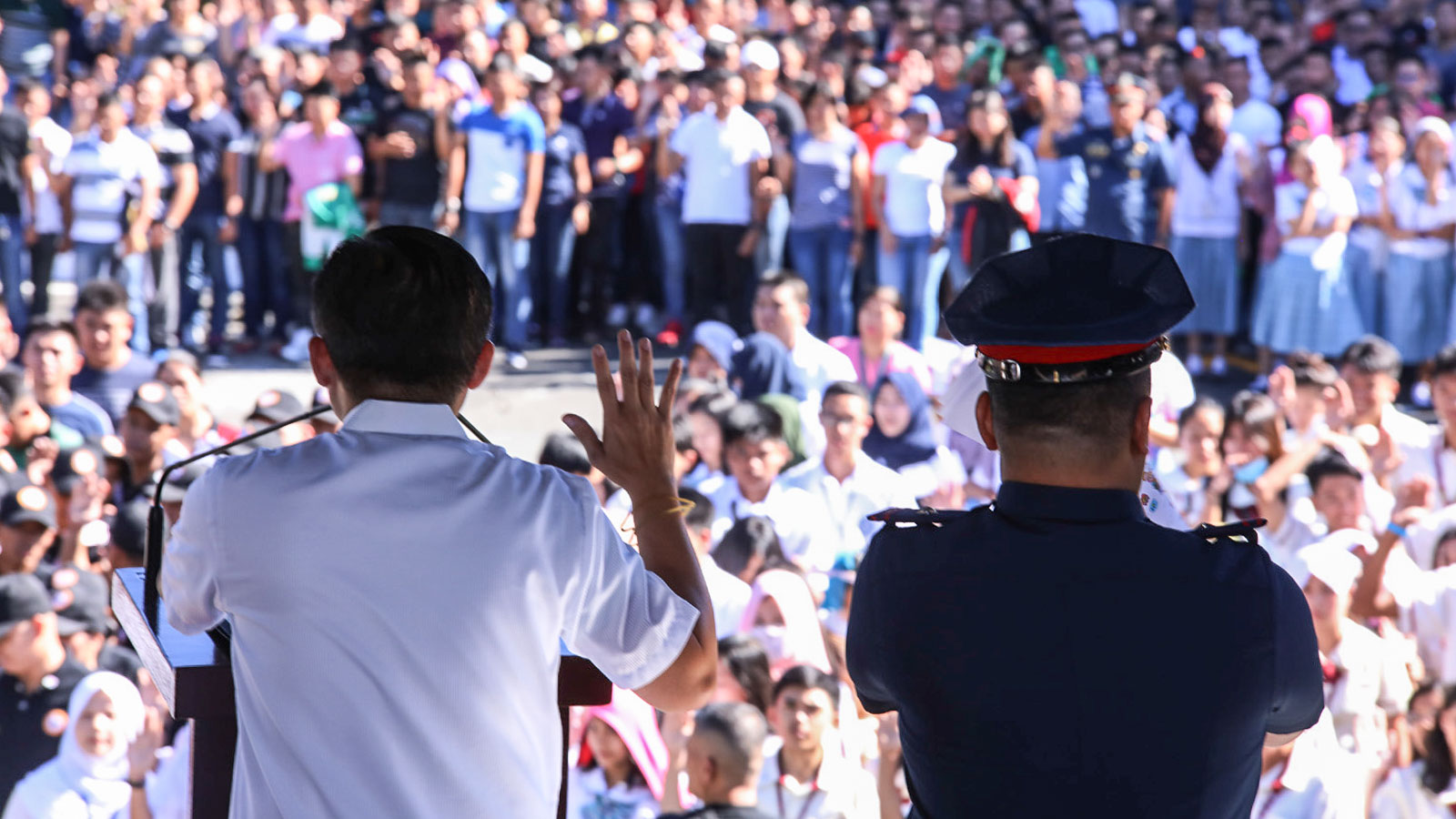
Bong Go’s double-digit rise
The January 2019 Pulse survey – the latest publicized survey – shows at least 15 names have a shot at the “Magic 12.”
Included in list are incumbent senators Aquilino “Koko” Pimentel III and Benigno “Bam” Aquino III; former senators Jinggoy Estrada, Manuel “Mar” Roxas II, Ramon Revilla Jr, and Serge Osmeña; and newbies former Duterte aide Christopher “Bong” Go, former police chief Ronald “Bato” dela Rosa, and Ilocos Norte Governor Imee Marcos.
At least 3 other survey laggards cannot be dismissed just yet: incumbent senator JV Ejercito, former senator Juan Ponce Enrile, and former Duterte adviser Francis Tolentino. They are known to have the wherewithal to run a serious and winning campaign.
The 15 who have a shot at Senate seats for now are 7 re-electionists, 7 former senators, and 4 newbies. Many of them only started pouring money on ads after February 12.
But it’s Duterte’s former aide, Bong Go, who is poised to become the story of these elections, whether or not he wins.
From a voter preference of 5.9 points in March 2018, Go rose steadily to debut in the “Magic 12” in January 2019 with 44.7 points – after showing a dramatic 15-point back-to-back improvements in December and January surveys.
Go ranked to 6-12 to become statistically tied with old political names Pimentel, Estrada, Roxas, Marcos, and Revilla. Published news reports of a commissioned January SWS poll also reflected Go’s rise, showing he is tied with Angara at rank 5-6 with 41 points.
Pulse Asia research director Ana Tabunda attributed Go’s rise to 3 factors: heavy spending before the campaign period, Duterte’s endorsement, and attaching his name to the government’s newly-launched Malasakit one-stop-shop medical services delivery.
“If he maintains spending, he will surely be in the Magic 12,” said Tabunda.
Go’s dramatic rise followed an air and ground campaign that capitalized on his ties with Duterte. He stands as the biggest ad spender at P422.5 million, based on data from the Nielsen Media Monitoring Reports.
He also enjoyed a favorable exposure on Maalaala Mo Kaya, which was shown a week after Angara’s. But it bears watching if the newbie candidate is able to show staying power especially toward the end of the campaign as other candidates also go full swing on media ads and ground campaign.
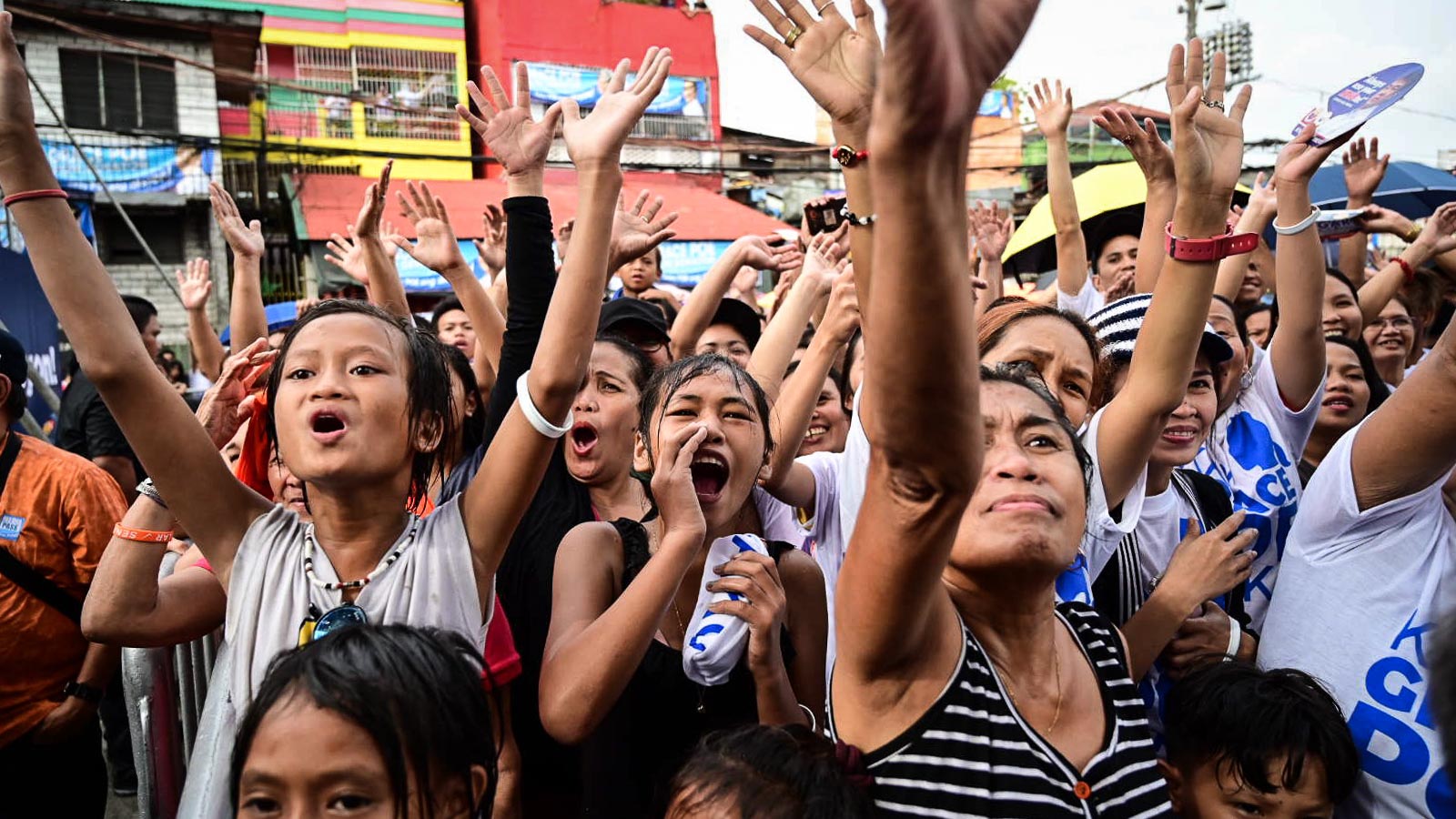
Negative campaigning, bloc votes, junking
With the elections still months away, Ong said a lot of things can happen. “It’s anybody’s game,” she said.
Erwin Tulfo’s botched senatorial bid is a cautionary tale of how scandals can break front-runners. He ranked 7th in a March 2018 survey with a 36.7% voter preference that bested the likes of Lito Lapid and Jinggoy Estrada. A corruption scandal killed his chances almost overnight. He dropped out of the race.
Ong warned of negative campaigning potentially shaping the campaign, especially on social media. So far, attack ads have not been allowed on traditional media, which remain the voters’ dominant source of information.
“As a general rule, negative campaigning is more effective than positive campaigning. It makes or breaks candidates. If these people in the ‘Magic 12’ do something or have done something and it comes out, the numbers could change,” said Ong, who was responsible for the country’s first known attack ads in 2001. They have since been disallowed.
Factual criticisms are one thing, which Ong said should be allowed. Disinformation campaigns — the lies propagated by Internet trolls — are another. Photoshopped photos of Roxas from the 2016 campaign have resurfaced, for example, to ridicule the candidate.
It happens offline, too, as JV Ejercito complained of tarpaulins showing him celebrating deaths from measles. Media organizations, including Rappler, have stepped up fact-checking initiatives.
“[This] being an election year, I have expected some to resort to black propaganda. But when dirty tricks make fun of a serious issue, such as the measles outbreak, then I have to condemn it as heartless and reckless. Beat me up, but please leave innocent children alone,” Ejercito posted on Twitter.
In a campaign highly covered and shaped by the media, candidates will find themselves walking on eggshells. The senatorial debates that offer free media exposure as alternative to expensive ads also come with risks.
“Sometimes they shoot themselves in the foot,” said Ong. In 2013, for example, Villar suffered an online backlash and ended up apologizing for a statement she made about nurses in a televised debate. Several survey topnotchers – Lapid, Ejercito, and Anagara – have said they are not inclined to join the debates.
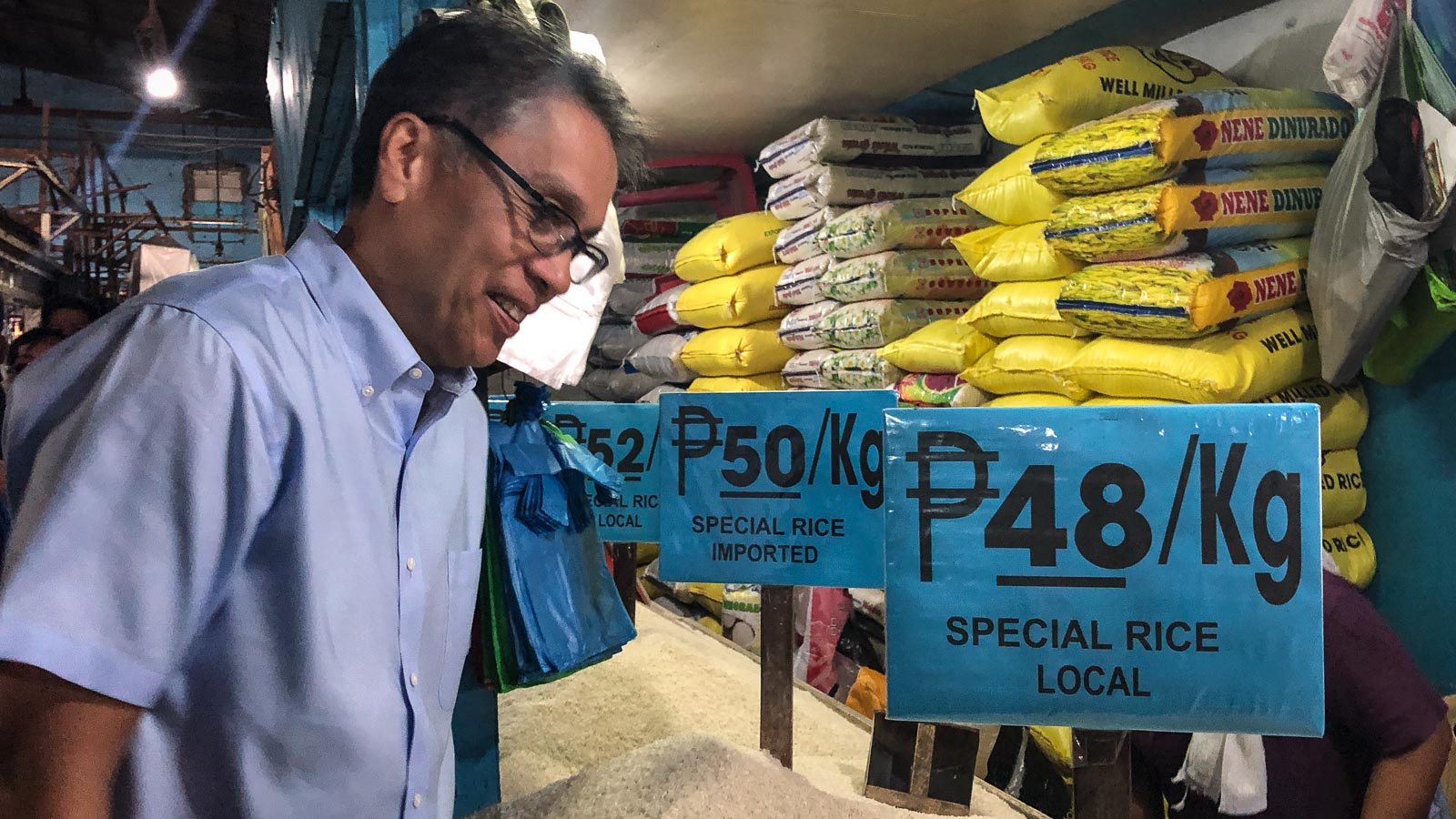
The steady rise of Roxas, Marcos, Aquino
It’s also former senator Roxas who could stand to become the biggest beneficiary or victim if the election turns out to be a referendum on Duterte. So far, the Liberal Party stalwart, who topped the 2004 Senate race and placed second to Duterte in the 2016 presidential polls, is among 3 candidates, other than Go, who showed significant improvements in surveys from December to January. Others slipped or slowed down, based on the 3-point error margin.
Roxas ranked 7-14 in the January Pulse survey with 41.8 points – a back-to-back increase of 7.8 points and 6.8 points in the December and January polls, respectively. Roxas is the only opposition candidate so far showing a good chance of winning.
Two other candidates – Marcos and Aquino – also showed a steady rise from December to January, although slower than Go and Roxas. All 4 are notably among the top ad spenders since last year.
Imee, the daughter of the late dictator Ferdinand Marcos, ranked 7-15 in the January survey and was just behind Roxas with 41.2 points. She posted a combined 8.6-point improvement since December.
Meanwhile, reelectionist Aquino continues to struggle to squeeze into the “Magic 12” even as his numbers are statistically tied with the Magic 12 bottom dwellers (ranks 10-15). He posted a dramatic 18.4-point rise since December, however, and could dislodge “Magic 12” bets if he keeps his trajectory.
Roxas, Marcos, and Aquino also are old political names dating back to pre-martial law years. They have the political wherewithal to launch an expensive campaign if they choose to fight it out.
They have spent P401 million, P413 million, and P136 million, respectively, in advertising since last year.
But Roxas, Marcos, and Aquino may rise or fall, depending on how the campaign plays out. Marcos was endorsed by Duterte, while Roxas and Aquino could expect attacks from Duterte’s supporters, if not from the President himself.
On top of this, Marcos and Aquino also have to contend with the baggage of a decades-long political rivalry. Marcos is expected to face attacks from determined critics of her father; and Aquino from Marcos loyalists.
Another old name from the martial law years who could make a comeback is Osmeña. He ranked 10-15 in the January 2019 Pulse (37.7%).
Other scions of old political brands who are outside the “Magic 12” are former Quezon Representative Lorenzo Tañada (rank 24-29) and human rights lawyer Chel Diokno (rank 24-31), both with Roxas and Aquino in the opposition.
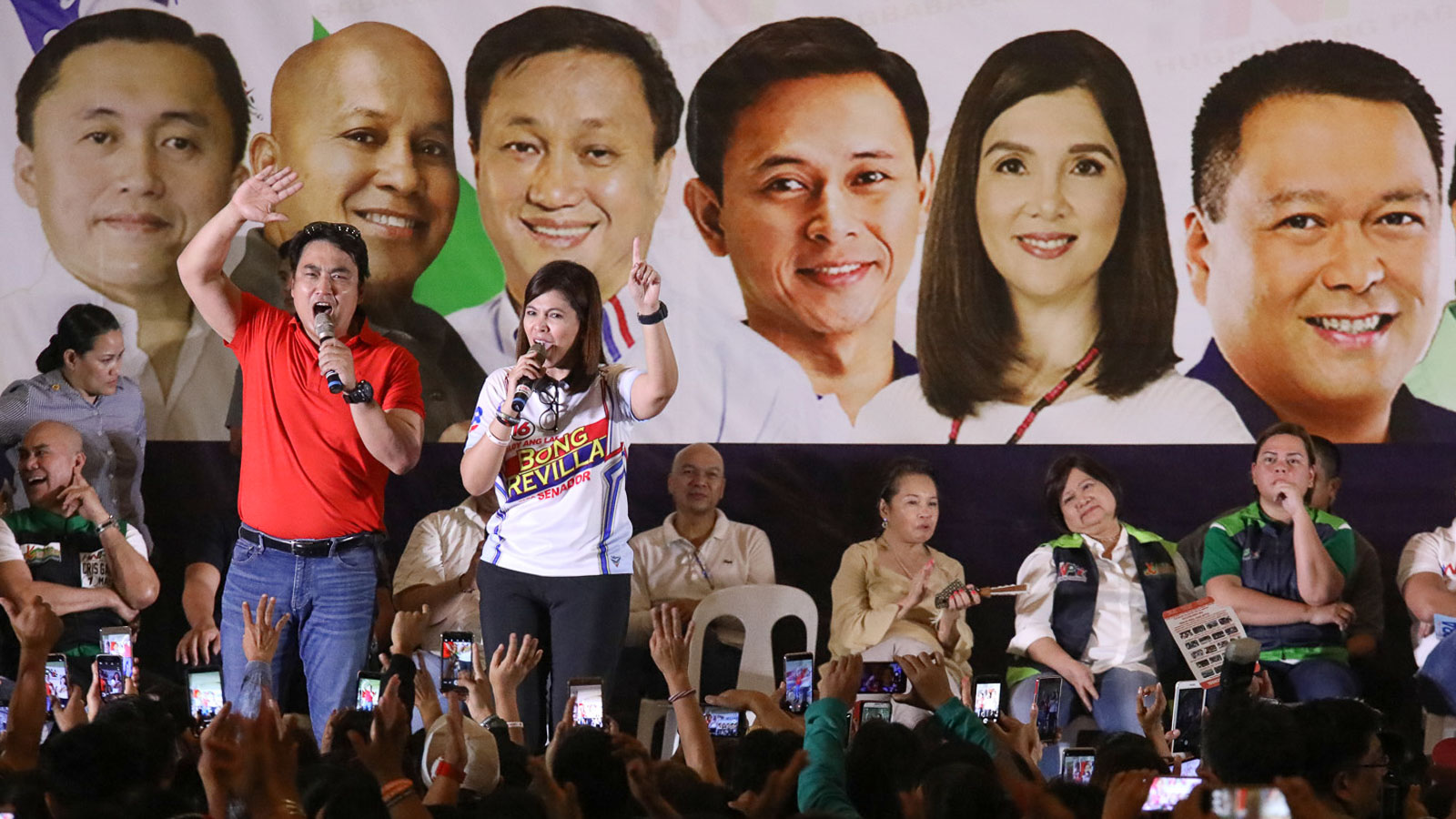
‘Pork barrel’ senators and bottom-dwellers
Three former senators linked to the multi-million-peso pork barrel scam are looking for redemption: Revilla, Estrada, and Enrile.
Revilla launched his campaign after his plunder charges were dropped. The former senatorial topnotcher and rumored presidential hopeful shot up in the surveys almost immediately, rising from 15th in the October 2018 survey to 8th in January 2019. The last polls showed a slowdown, however, and whether or not he’s reached the peak of his numbers remains to be seen.
The son of former president Joseph Estrada, Jinggoy, currently hovers at the bottom half of the “Magic 12,” ranking 6-12. Enrile is outside the “Magic 12,” ranking 17-18.
Estrada’s other son, JV Ejercito, is in a precarious situation, finding himself outside the winning circle in most recent surveys.
Two other newbies just outside the “Magic 12” before the campaign period could benefit if Duterte proves his endorsement power in these elections: Dela Rosa and Tolentino.
Dela Rosa made an early showing in the “Magic 12” in November 2017 in the Laylo Research Strategies Survey, when he enjoyed constant media exposure to defend deaths in Duterte’s bloody campaign against illegal drugs. He saw his numbers decline since his retirement, however, and dropped out of the winning circle as the media attention dwindled. He hovered from 11-16 in the January 2019 Pulse survey with a 36.9% voting preference.
The former police chief may also get support from the alumni of the Philippine Military Academy, including his mistahs in the Class of 1986, who are leading the Philippine National Police and key posts in the military.
Tolentino, the 13th placer in the previous senatorial race, is determined to fight his way to the “Magic 12” this year. He has room to rise with his awareness rating still relatively low at 75 points before the campaign period.
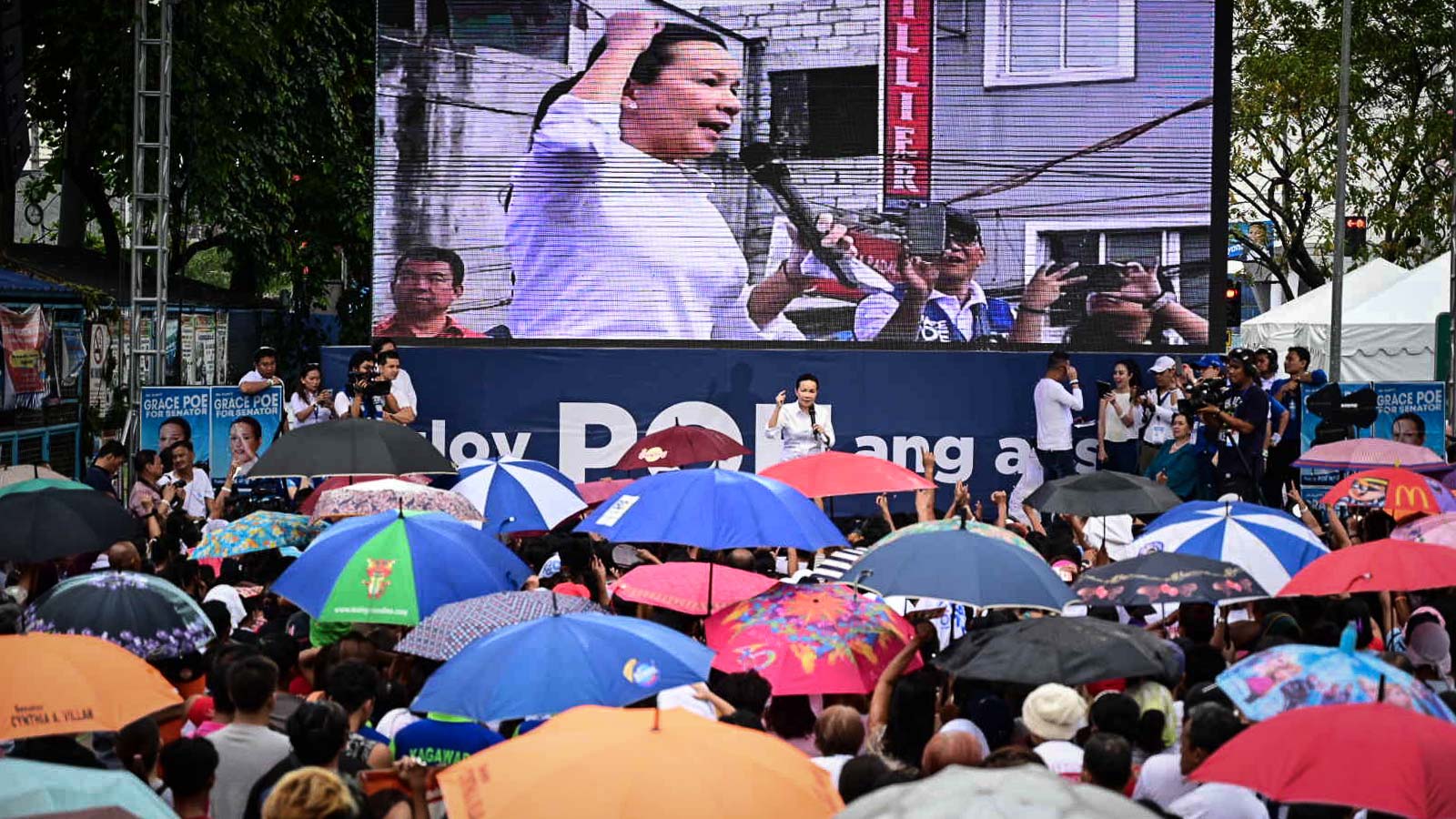
Eyes on 2022 presidential race
What could shake the campaign is 2022. As the country begins the search for Duterte’s successor, presidential wannabes and potential funders will be making their moves to introduce campaigns or trial balloons.
No one has so far declared intentions to run, but presidential daughter Sara Duterte’s name has been floated. The heir to Duterte’s political throne in Davao City has also launched her own regional political party, Hugpong ng Pagbabago, which has endorsed its own senatorial bets and subsumed those from her father’s party, PDP-Laban.
But Duterte has his own list separate from his daughter’s. The campaign is poised to see more father-daughter dynamics.
Meanwhile, survey topnotcher Poe is trying to keep the reelectionists together, gathering them around her in campaigns.
“We are independent candidates. That’s why we held our own rally because we also want to help other reelectionists,” said Poe after campaigning in Manila on February 13.
How will Poe, who also lost to Duterte in 2016, play this out? With 2022 looming, candidates will have to assess which alliances are beneficial for any future plans. Four out of 7 reelectionists are endorsed by Duterte: Pimentel, Villar, Angara, and Ejercito. Will Duterte anoint one of them to be his successor? How will the others package themselves?
It is in this light that the survey laggards in the opposition cannot be ignored. If at any point Duterte’s popularity tanks, they could raise their chances in May or the next elections. Senator Risa Hontiveros won on her 3rd try, after all.
Elections are a long game, clearly. The winning narrative in May 2019 remains to be seen. It might surprise us all. – Rappler.com
Carmela Fonbuena obtained her MA Political Communication degree from Cardiff University in the UK. She took a course on polling and public opinion.
Add a comment
How does this make you feel?
There are no comments yet. Add your comment to start the conversation.